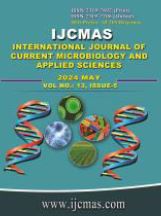


 National Academy of Agricultural Sciences (NAAS)
National Academy of Agricultural Sciences (NAAS)

|
PRINT ISSN : 2319-7692
Online ISSN : 2319-7706 Issues : 12 per year Publisher : Excellent Publishers Email : editorijcmas@gmail.com / submit@ijcmas.com Editor-in-chief: Dr.M.Prakash Index Copernicus ICV 2018: 95.39 NAAS RATING 2020: 5.38 |
India is growing old! The stark reality of the ageing scenario in India is that there are 77 million older persons in India today, and the number is growing to grow to 177 million in another 25 years. With life expectancy having increased from 40 years in 1951 to 64 years today, a person today has 20 years more to live than he would have 50 years back. However, this is not without problems. With this kind of an ageing scenario, there is pressure on all aspects of care for the older persons – be it financial, health or shelter. As the twenty first century arrives, the growing security of older persons in India is very visible. With more older people living longer, the households are getting smaller and congested, causing stress in joint and extended families. Even where they are co residing marginalization, isolation and insecurity is felt among the older persons due to the generation gap and change in lifestyles. In this context a study was conducted to understand the feeling of elderly residing in the family setup in the Chapra district. The sample of elderly women was selected using the purposively” sampling” technique to select 20 elderly women from the family setup. Among the 20 women, 10 were widows. The data was collected using a specially designed interview schedule and observation technique through a door to door survey for these residing in the families. Non working status of these women and above 60 years of age was criteria for sample selection. Results of the study revealed that most of the elderly felt the attitude of the younger generation unsatisfactory. In terms of getting respect, love and affection from the family members instead they were considered as burden for other. Women living in the families had negative attitude towards old age because they were neglected by off spring.
Bambawale U. The abused elderly. Indian J Med Res. 1997 Oct;106:389-95. PMID: 9361473.
Jamuna and Padmasree, 2000. Psychological profiles of absue elderly. Indian Journal Gerontology. 10(3):11-19.
Kapoor, 1997. Elderly abuse; some counseling tips. Research & Development Journal. 3(3): 13-23.
Prakash, 1997. The Status and Condition of Elderly Widows in India. In K. Bagchi (Ed.), Elderly Females in India, New Delhi: Society for Gerontological Research and HelpAge, 45-64. Ramamurti & Jamuna, 1999. Evaluation of old age homes, day care centres and mobile medical units in Andhra Pradesh, Tirupathi, India: Centre for Research on Ageing.
Shah et al., 1995. Elder abuse in India. Journal of elder abuse & neglect. 6(3/4): 101-118.
Shankardass, 1997. The Plight of Older Women: Victims of Domestic Violence. In K. Bagchi (Ed.), Elderly Females in India, New Delhi: Society for Gerontological Research and HelpAge, 79-88.
Shankardass, Mala Kapur. 2003a. Concern for Ageing Women in India, Bold. Vol. 13(3): 19-24.
Shankardass, 2003b. Combating elder abuse in India: an emerging social, legal and public health concern. In Understanding the Early Detection and Early Intervention in Elder Abuse in Developed and Developing Countries and Efforts to Develop Measures for Combating Elder Abuse in Asian Countries: A Status Report, Symposists’ Papers, Japan: The 7th Asia/Oceania Regional Congress of Gerontology, Tokyo.
Shankardass, 2004c Shankardass, M. K. (2008). Critical understanding of prevalence of elder abuse and the combating strategies with special reference to India. Indian Journal of Gerontology, 22 (Special Issue), 422–446.
 |
 |
 |
 |
 |